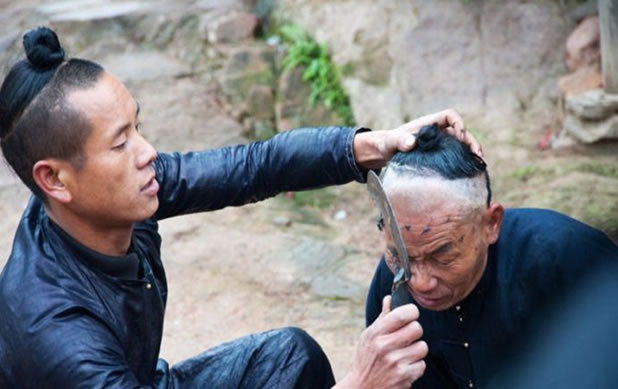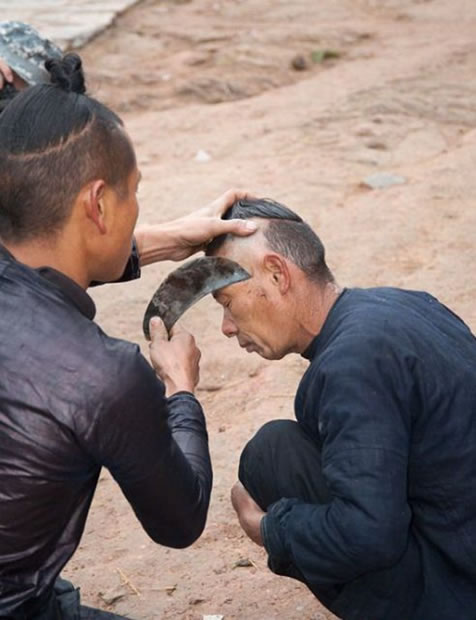September, 2003 Proverb: “Where there is peace, a billhook (sickle) can be used to shave your beard or cut your hair.” – Rundi (Burundi)
Là où il y a la paix une serpette peut raser/couper les cheveux. (French)
Kuliko na amani mundu hunyoa ndevu/hukata nywele. (Swahili)
Where there is peace, a billhook (sickle) can be used to shave your beard or cut your hair. (English)

Rundi (Burundi) Proverb
Background, Explanation, Meaning and Everyday Use
A billhook (sickle) is a cutting or pruning tool that is made up of a long, usually wooden handle and a curved and sharp blade at the top. In traditional Burundi life it was used to cut grass, small branches off trees, and the like. In contemporary Burundi life it is still used in rural areas, sometimes alongside a panga (machete). Given its nature and function, it was extremely unthinkable that this tool could be used to shave. Probably from historical experiences of internal wars between Hutus and Tutsis or other kinds of socio-political unrest in traditional Burundi and external wars as well with neighboring countries (kingdoms), our ancestors came to realize and appreciate the value of peace.
This proverb was used to convey the message that, where there is peace, everything is possible. In other words, even what people think is impossible can become possible when or where there is peace. A good example is how Burundians knew how to cope with natural calamities such as drought, floods, famine, etc. Because of freedom of movement that is guaranteed by peace, people during famine were able to go to look for food wherever it could be found for their family members. Neighbors could share with those who were in need, whatever it was and however little it was, and life continued. They could eat strange plants or animal meat and in this way they discovered new foodstuffs and they survived. People helped each other in harmony and overcame whatever calamity
 Biblical Parallels
Biblical Parallels
The above proverb has many biblical parallels. Let us consider the following selected ones: Proverbs 17: 1: “Better a dry crust with peace and quiet than a house full of feasting, with strife.” Isaiah 32:17: “The fruit of righteousness will be peace; the effect of righteousness will be quietness and confidence forever.” Mark 9: 50 “Salt is good, but when it loses its saltiness, how can you make it salty again? Have salt in yourselves, and be at peace with each other.” 1 Peter 3: 10: ” For whoever would love life and see good days must keep his tongue from evil and do good; he must seek peace and pursue it.” Matthew 19:24: It is easier for a camel to go through the eye of a needle than for someone who is rich to enter the kingdom of God.”
Contemporary Use and Religious Application
Both the biblical parallels and this Rundi proverb provide an important lesson and reminder to all of us Burundians — Hutu, Tutsi and Twa alike — and anyone else, that we need to work hard to keep peace and restore it where it is lacking, for peace is the source of other important things one may want to achieve. The proverb recommends righteousness, love, harmony and peace, as very needful for the comfort of every human life at any time and level, i.e. family level, community level, national level, etc. True comfort is not necessarily in material possessions (although we need them). Material possessions cannot bring true satisfaction to human beings’ hearts without peace that could be peace of mind, peace with each other and peace with God, through a godly or righteous life in Jesus Christ our Lord and Savior. For example, one would not be wrong to say that even the richest in Burundi are not really enjoying their riches, as they ought, for they worry day and night for their dear lives. Meaningful development is almost impossible at any level, be it at individual level, family level or national level. Traveling becomes difficult, social relations deteriorate, family breakdowns and other social ills increase. The country continues to become poorer and poorer, and people cannot cope with drought and diseases and other calamities as they used to. People are just desperate, without hope for tomorrow.
In short, when there is no peace, everything becomes problematic and unpromising for everyone, Tutsi, Hutu, Twa, as well as foreigners without any exception. However, hope amidst hopelessness is building up as more and more Burundians and the international community are realizing or remembering the value of peace and as they keep praying and working hard, day and night, in various capacities for the restoration of peace and harmony in Burundi.
As we remember “9-11” (11 September, 2001), the April-May, 2003 war in Iraq, and the 19 African countries presently in a state of civil war, internal unrest and tribalism, let this Rundi proverb inspire us and challenge us to be peacemakers starting in our own homes, local communities and with a spirit to reach around the world.
Note: This is Proverb No. 48 in the Collection of 100 Rundi (Burundi) Proverbs collected by Jean Nyandwi. Endangered African Proverbs Collections: A Continuation of the African Proverbs Project. Nairobi, Kenya: Privately printed, October, 2003. 29 pages.
Jean Nyandwi
University of Nairobi
Nairobi, Kenya
E-mail: njeances2000@yahoo.fr or jeann@worldconcern.org
